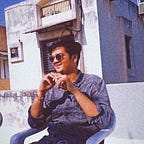Apolitical commentary on the revolutionary aftertaste of ‘Rang De-Basanti’
With each day that passes, with each year that goes on, I’m reminded of the immortality of my soul. The idea of the soul and its immortality makes me wonder if the people from the Third Reich would have…or so desperately are watching the third Reich…The Indian Subcontinental third Reich. The foundational traumas of generationally passed on ideologies lie on the shoulders of often the predecessor of any ideology. That’s why the old man would want his soul to live on forever. That’s why his son would often defy the continuity of human nature…rather of human life.
अभी भी जिसका खून ना खौला, खून नहीं वो पानी है। जो देश के काम ना आए, वो बेकार जवानी है।
Yesterday, on the podcast…We were talking about the paradox of catch-22, The conversation was primal, and in all its primacy, we discussed the notion of dying for a country and still not doing enough for its people…Is there where the reality of defying the continuity of human life lies? We would then go on, and talk about how everyone wishes to die for their country, then neglecting the idea for the sake of ourselves and the revolution within us, we would unconsciously move on…I would rather feel like this whenever I would hear ‘Rang de Basanti’ from Rang de Basanti.
More than the film, the songs of Rang-de-Basanti have had a bigger impact on me. The stubborn self-indulgence of D.J(Aamir Khan), and its contradiction is often highlighted for me, with just the last few seconds of the song ‘Rang-de-Basanti’ I feel the film with all its shyness and evaporated idea of becoming, of fulfilling ourselves in something bigger, gets not lost, but smaller…what revives it for me is the proud flicker and loud stance of Daler Mehndi in those last few seconds of the song…It feels as if the film is not a journey of just becoming, but of re-birthing an individual for a lost cause.
The poetic representation of youth is not just literal but very symbolic, the idea of dying for a country exceeds, just the idea of dying for a country, there is a warped sense of authoritarian altruism which is bundled up in the very idea of narcissism. Can dying for a country be an act of narcissism, can it still proceed as a thing with its foundation in altruism. How then can I critique morality? How then can I even question the very faith and foundation of ‘Rang De Basanti’
The Colonial subjugation of India had left unmeasurable marks on the bodies of its ever-growing-un-lasting youth. With every generation juxtaposed to the last, hoped to clear and clean the streets, eventually failing on a bigger level. The revolution and the voices against the garden bureaucracy were always partial, until my generation…Is that a pre-disposed notion in the youth and young people to think about changing the world, I wonder if the generation before me thought about changing the system. If the generation before that and the generation before that… I wonder if it’s the youth in reality and their blood that want to change and re-structure the whole hierarchy, or either if it’s just some people who are born to break natural laws and systemically developed beliefs…In any case, I have always loved my country, I have always wished to die for it…But I have also always secretly believed that the world will end by breaking my abstract ideas, and me.
“Everyone, deep in their hearts, is waiting for the end of the world to come”
Murakami ‘1Q84’
This week In the cinema while watching, Joseph Kosinski’s ‘Top Gun: Maverick’ Beneath all its absenting score, the only thing I remember aside from its idea of American patriotism, and even American patriotic film culture, is Vice (Jon Hamm) saying to the charming yet an old Maverick (Tom Cruise) “The future is coming and you’re not in it” It takes me back and reminds me of the short continuity of human life…While knowing your death is coming, and not knowing what your obituary looks like, and still willing to die for your country, in a hope that you might just spark something, that you might just start a revolution, that you might wake up a whole generation. That it might help people with a better life. Will that still come under the banner of narcissism?
‘Rang De Basanti’ surfs over different philosophical dimensions, The film is many things and it would be erroneous to just see the film as a political incitement to the youth of India. The film creates a black and white world and then paints it, Gray. The film is a collective expression of unfathomable emotion. There is even a visible tint of nihilistic-cynical people who find the world an unimaginable place to live. As Nolan defines the most resilient parasite an idea, it’s very similar within the context of ‘Shaheed Bhagat Singh’ and their idea of ‘Inqilab’ But it can be also viewed as an incontestable generational trauma…When we die, when this generation will die…They’ll find our revolution in the last trance of ‘Rang-De-Basanti’
